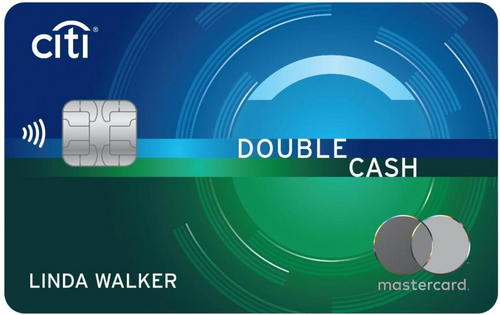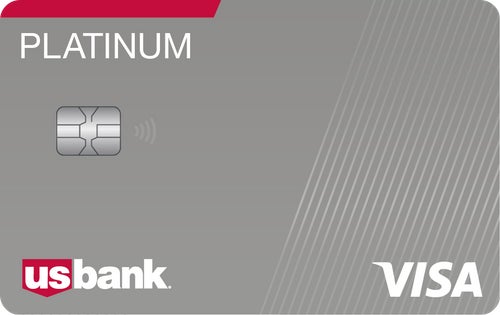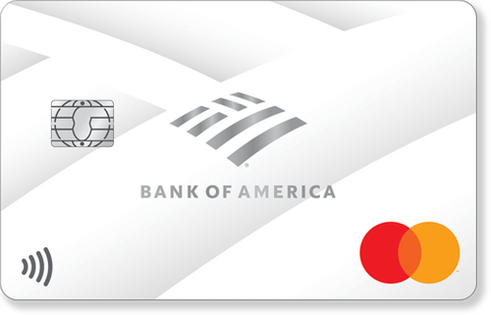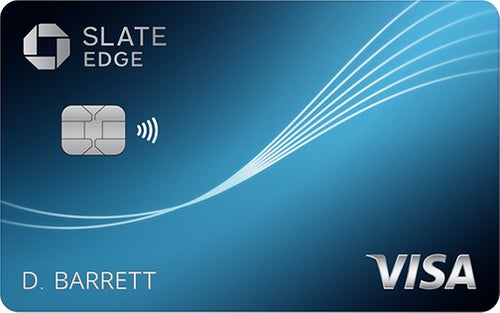| Balance Transfer Rating: | 4.5 / 5 |
| Introductory Offer: | 4.5 |
| Rates & fees: | 3.5 |
| Features: | 4.0 |
| Issuer Customer Experience | 4.0 |
In a Nutshell:
The Chase Slate Edge card comes with some unique features and a longer intro APR offer on new purchases and balance transfers.
All information about the Chase Slate Edge has been collected independently by CreditCards.com and has not been reviewed by the issuer.
0% Introductory Period |  |
Transfer Fee
|  |
Introductory Purchase APR |  |
Regular APR |  |
Annual Fee |  |
Chase Customer Service Ratings
|  |
Other Notable Features: Lower APR by 2% each year if you pay on time and spend at least $1000 on your card by your next account anniversary, automatic, one-time review for credit limit if you pay on time and spend $500 in first six months, Chase Credit Journey
The newest balance transfer credit card from Chase, the Chase Slate Edge, comes with an array of unique features that set it apart from others in its category. Although the Chase Slate Edge no longer offers a cash bonus offer, you can lower your ongoing APR and be eligible for a credit line increase when you meet the card’s minimum spending and on-time payment requirements. With a revised intro APR offer, the Chase Slate Edge could be the balance transfer card you need in your wallet.
While you may need to do the math and put together a debt payoff plan to see if the Chase Slate Edge makes sense for you, you’ll likely find that perks like credit educational tools and a chance at lowering your ongoing APR can’t make up for the card’s limited long-term value.
See related: How do balance transfers work?
Current intro APR offer
Although the Chase Slate Edge no longer carries some unique features for a balance transfer card, it could be a solid option if getting a competitive intro APR period is your top priority.
The card offers a 0% intro APR on new purchases and balance transfers for your first 18 months, after which a 20.49% - 29.24% Variable APR applies (about the average credit card APR range). Previously, the card came with only a 12 month introductory APR period. Now that it has increased to 18 months, the card is positioned to be much more competitive with similar cards. It is now on par with the U.S. Bank Visa® Platinum Card which carries a 0% intro APR offer on balance transfers for a 18 billing cycles (a 19.49% - 29.49% (Variable) APR applies after that).
Having 18 months worth of breathing room to finance new purchases or chip away at card debt while paying no interest will still save you a significant amount of money. And since all of your payments will be going toward your principal balance for the first 18 months, you can get out of debt faster.
See related: How do intro APRs work?
To get a sense of how much you can save by taking advantage of this Chase balance transfer offer let’s say you owe $5,000 on a credit card with a 21% APR and you’re currently paying $300 per month to get out of debt. At this rate, it would take you 20 months to pay off your balance, and you’d fork over around $964 in total interest payments.
As you can see if you try out our balance transfer calculator, if you transferred your balance to the Chase Slate Edge card instead, you could be debt-free in a little under 18 months and save nearly $814 in interest payments when you account for the balance transfer fee. If you transferred your balance within the first 60 days, you’d pay a 3% balance transfer fee of $150, bringing your total balance to $5,150. If you then made the same payment of $300 per month payment, your balance would be paid off in just under 18 months and your only cost would be the $150 balance transfer fee.
Card rates and fees
After your intro APR period ends, you’ll face the Chase Slate Edge card’s ongoing 20.49% - 29.24% Variable APR, depending on your creditworthiness. However, the Chase Slate Edge gives you more control over this rate than the average credit card.
You also won’t need to worry about an annual fee with the Chase Slate Edge card, so if you manage to pay off your balance during the promotional period, you’ll only owe the balance transfer fee.
Be sure to transfer in a timely manner, however, as the card’s balance transfer fee is 3% (or $5, whichever is higher) only for the first 60 days, after which it jumps to 5% (or $5, whichever is higher).
Card perks
Like most dedicated balance transfer and low interest credit cards, the Chase Slate Edge doesn’t offer a ton of ancillary benefits.
You’ll also get access to Chase’s digital credit tools like Credit Journey, which can help you keep tabs on your credit score, and My Chase Plan, the issuer’s take on a buy now, pay later service, which lets you split up the cost of a purchase and pay for it over time in set installments for a small fee. The latter perk could be particularly useful once you’ve finished paying off your debt, as it can help you keep your spending stay on track and avoid racking up another unwieldy balance.
How does the Chase Slate Edge card compare to other balance transfer cards?
The Chase Slate Edge comes with some standard balance transfer card features similar to other card options in the market that could save you money as you chip away at new purchases or transferred debt. Plus, its revised intro APR offer helps the card come up to par with the offers you’ll find on some of the best balance transfer cards.
 |  |  |
Rewards rate
| Rewards rate
| Rewards rate
|
Introductory period (balance transfers)
| Introductory period (balance transfers)
| Introductory period (balance transfers)
|
Introductory period (new purchases)
| Introductory period (new purchases)
| Introductory period (new purchases)
|
| Regular APR 17.49% - 27.49% (Variable) | Regular APR 19.49% - 29.49% (Variable) | Regular APR 16.24% - 26.24% Variable APR on purchases and balance transfers |
Other things to know
| Other things to know
| Other things to know
|
Citi Double Cash Card
Not only is the Citi Double Cash one of the best flat-rate cash back cards on the market, but it also carries a similar balance transfer offer. Along with the up to 2% cash back you can earn on all eligible purchases (1% when you buy, 1% when you pay off your purchase), you’ll get a 0% intro APR for 18 months on balance transfers (then 17.49% - 27.49% (Variable) APR thereafter). While the card lacks an intro APR on new purchases, its high everyday cash back rate means it should offer better long-term value than the Chase Slate Edge card.
U.S. Bank Visa Platinum Card
If your focus is getting as much time as possible to chip away at debt or finance new purchases while avoiding interest, the U.S. Bank Platinum Card should be at the top of your list. The card offers one of the longer intro APR periods available on the market today. You’ll get 18 billing cycles to pay down debt or stretch out payments on purchases while paying no interest (then 19.49% - 29.49% (Variable) APR applies).
Who should get the Chase Slate Edge card?
- Cardholders who can afford to pay off their balance in 18 months or less.
- Cardholders who would welcome a product change to another Chase credit card after they tackle debt or finance new purchases with the Slate Edge.
How to use the Chase Slate Edge card
- Make sure you have a payoff plan in place before you apply for the card and balance transfer – you’ll only have 18 months to pay down your debt at a 0% intro APR, after which you’ll face an ongoing 20.49% - 29.24% Variable APR.
Is the Chase Slate Edge card worth it?
The Chase Slate Edge card’s intro APR offer compares well to those you’ll find on many competing low interest and balance transfer credit cards, making it a great deal for the right cardholder. If you have a debt payoff plan in place and are confident you can make a big dent in your balance in your first 18 months as a cardholder, the Chase Slate Edge card could be a viable option if your top priority is paying off debt without wanting any lucrative ancillary benefits or card perks.
All reviews are prepared by CreditCards.com staff. Opinions expressed therein are solely those of the reviewer and have not been reviewed or approved by any advertiser. The information, including card rates and fees, presented in the review is accurate as of the date of the review. Check the data at the top of this page and the bank’s website for the most current information.
Responses to comments in the discussion section below are not provided, reviewed, approved, endorsed or commissioned by our financial partners. It is not our partner’s responsibility to ensure all posts or questions are answered.
